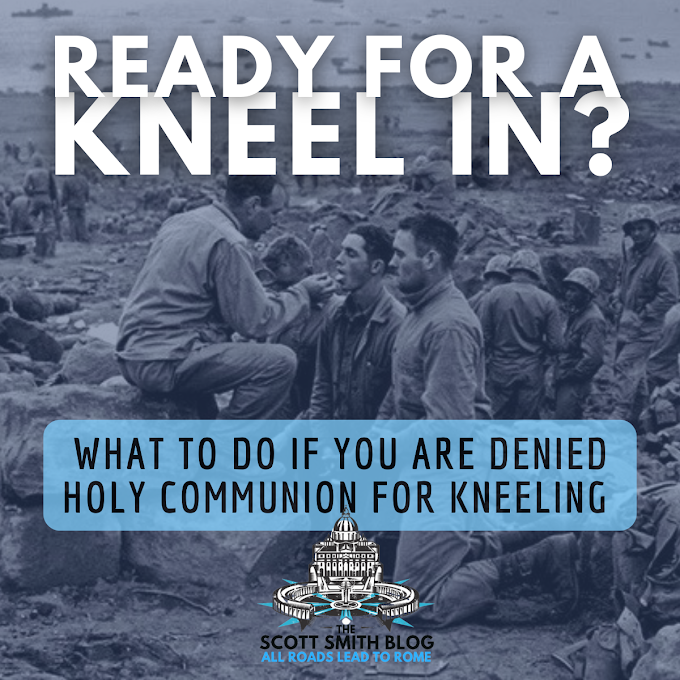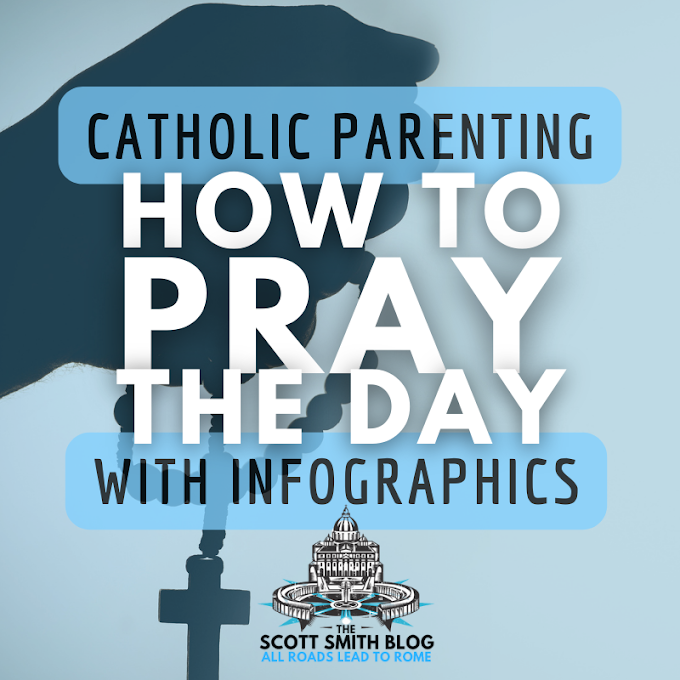In this post you will learn
If there was ever a zinger to stump Protestants, it is this question. And it's such a simple question! If all Christians truly knew and understood this question, our divisions would begin to evaporate.
Where did the Bible come from?
That's it. That's the question every Protestant must answer for himself or herself.Did Catholics add the deuterocanonical books, the so-called Apocrypha? Or did Protestants remove these books? Because the books contradicted Protestant theology?
Here's also a great interview of Dr. John Bergsma, a Protestant minister and convert to Catholicism, on The Journey Home, which centers on these basic questions that troubled him as a Protestant:
Dr. Bergsma describes how, as a Protestant minister, he couldn't satisfactorily answer the fundamental question of where the Bible came from. This ultimately resulted in his Catholic conversion.
So, what's the Answer? Where did the Bible come from? What Bible did Jesus and the Apostles use?
It is extremely important to get this right. Did Catholics add books or did Protestants take books away?
There is a terrible warning against adding or taking away books from the Bible. Revelation 22:18-19:
[18] I warn every one who hears the words of the prophecy of this book: if any one adds to them, God will add to him the plagues described in this book, [19] and if any one takes away from the words of the book of this prophecy, God will take away his share in the tree of life and in the holy city, which are described in this book.
For 1500 years ...
From the time of Christ until the Protestants break from the Catholic Church ...
All Christians everywhere had been using the same version of the Old Testament.
Then Martin Luther comes along.
Guess which version of the Old Testament, i.e. the Jewish Scriptures, Jesus and the Apostles used? The pre-Luther version.
Why would Luther and, subsequently, John Calvin change the Bible so dramatically, especially with their emphasis on Sola Scriptura, the doctrine of authority residing in the Bible alone? It doesn't make any sense.
The version of the Old Testament used by Jesus, the Apostles, St. Paul, and all Christians until the 1500s was the Septuagint version. It was the Greek translation of the Jewish scriptures. This was the translation commissioned by King Ptolemy of Egypt for his Library at Alexandria.
Septuagint? Weird word. Where's it come from? It means "seventy." King Ptolemy brought together seventy Jewish scholars to translate the Bible from Hebrew into Greek. Ptolemy isolated the translators from each other, so they could not collaborate. Miraculously, each and every translation was identical.
When Jesus reads from the Scriptures, he's reading from the Septuagint version.
When the Apostles read from the Scriptures, they're reading from the Septuagint version.
Then, what version should Christians read from?
Martin Luther took out the following books from the Septuagint translation of the Old Testament: Tobit, Judith, Wisdom, Sirach, Baruch, 1 & 2 Maccabees, and parts of Daniel and Esther.
Luther put these books into an appendix of his Bible. John Calvin ripped them out entirely.
But why these books? The all important question! Because Luther didn't find these books in the canon of the Jews of his time. Luther took his Table of Contents from the Jews of his time over the Jews of Jesus' time ... even over the Canon of Jesus, Himself!
So, ask yourself:
Which version of the Bible should you be reading?
The Bible Came from the Catholic Church
The Bible was (and is) a liturgical book meant for Catholic worship. In the first centuries, Christians began to ask, what can we read in church? They answered this question simply: What have we been reading in Mass? This was their principal criterion for canonicity: Tradition.That was how we got the Bible. According to Dr. John Bergsma, "[The Bible] was a book for the liturgy based on what was read in the liturgy."
Certain books were included in the Canon of Scripture and certain books were excluded. Why were certain books included? Who made the decision? What was the criteria?
Here is a great in-depth video from Dr. Brant Pitre on exactly these questions:
How do Protestants know that the Bible is Inerrant and Inspired?
Protestants have largely rejected the Catholic Canon of Scripture. Calvin and Luther removed several books from the Catholic Old Testament and cast suspicion on many books from the Catholic New Testament, as well.What proof do they offer for the Protestant Canon and the rejection of the Catholic Canon? Dr. Pitre answers this question above in his debunking of the so-called Council of Jamnia. I also address it in this article.
The underlying question, however, is more fundamental. How do we know the Bible is inerrant and divinely inspired?
Protestant Answer #1: No clue.
Many Protestants are even blind to where they got the idea that the Bible is infallible and divinely inspired. They simply don't know and don't care.How can this be? The Bible, itself, is silent on these subjects. You don't find a list anywhere in the Bible of which books belong in it. You don't find a statement within the Bible that it is infallible and inerrant, either.
So whenever a Christian, Catholic or Protestant, believes these things about the Bible, they are inherently putting trust in the Catholic Church which first taught them that. Therefore, according to Dr. John Bergsma, "if you believe in the infallibility of the Bible, you're actually assuming the infallibility of the Church."
Protestant Answer #2: It's obvious. It's self-evident.
"It's obvious, isn't it?" When you ask this question of our Protestant brethren, this will usually be the response. No, it's not obvious.Understandably, this isn't a question thoroughly explored in Protestant circles. Most Protestants you ask will be puzzled just by the premise of the question. This is an opportunity for another sola, sola fide ("Faith alone"). Faith and reason should go together.
Bergsma quotes a statement in one of his Dutch Reformed confessions: "even the ignorant can see the things that take place therein are being fulfilled." Say what? That's obviously some circular reasoning.
Want more circular reasoning? After a rejection of rational thought which might lead him to embrace of the Council of Nicaea, one Protestant pastor says "God’s word proves itself as God’s word."
John Calvin in his seminal work, Institutes of the Christian Religion, provides the following basis for the inerrancy and infallibility of the Bible:
Let this point therefore stand: that those whom the Holy Spirit has inwardly taught truly rest upon Scripture, and that Scripture indeed is self-authenticated; hence, it is not right to subject it to proof and reasoning. And the certainty it deserves with us, it attains by the testimony of the Spirit…it seriously affects us only when it is sealed upon our hearts through the Spirit. Therefore illumined by his power, we believe neither by our own nor by anyone else’s judgment that Scripture is from God; but above human judgment we affirm with utter certainty…that it has flowed to us from the very mouth of God by the ministry of men. (John Calvin, Institutes, I.vii.5)
There it is. Straight from the horse's mouth. The Canon of Scripture is "self-authenticated". It's self-evident and obvious. Not only that, it is "not right" to subject Scripture to "proof and reasoning". Yikes.
Nevertheless, Calvin does find proof for the Canon in the "testimony of the Spirit." The Holy Spirit provides proof that Scripture comes from God. When our hearts burn with the Spirit's fire upon reading, we know. This is true! But it is not the full truth. That's not how the Church decided what books would go in the Bible and which would not.
This "heart-burn" explanation actually creates more issues than it solves. Why? Mormons, for one, love this explanation for Scripture.
Have you ever had a Mormon missionary knock on your door? Ask them why they believe the Book of Mormon is Scripture. Ask a Mormon why their book deserves to be added to the Canon.
The Mormon will say "pray for the Holy Spirit" and "the Holy Spirit will confirm" that the Book of Mormon is Scripture. Uh-oh. The Mormons will ask after reading from their book, "did not your hearts burn with the reading of those words?" Gulp. How does a Protestant respond to that?
You see, the problem with throwing away the laws and history is that, once everything is wiped away, you will have nothing to defend your position with. Even against the devil, himself ...
No where is this so eloquently described as in the following scene from A Man For All Seasons:
I hope you enjoyed this article! Please comment below about your experience, as a Catholic or Protestant, asking or answering this question. Also, please remember to share!
















17 Comments
Baptists DO originate with John the Baptist because ‘we’ believe one must make a public confession of admitting ‘we’ are sinners. “We” do not believe that ‘water baptism’ ‘in and by itself’ does anything ’special’ ( it is symbolic like the bread and wine of the Last Supper = how can anyone think that Jesus actually offered a bottle of blood or that the wine actually changes into “ real blood ” ? It is clearly stated in the Gospel of John that Jesus was speaking “figuratively” about ‘all things’ even then to the disciples …furthermore that they would only be able to understand these words later when He was gone and the Holy Spirit ( the Logos ) came to them - indeed , ‘ baptizing ’ them in the Spirit of Truth and Understanding ) ….
Baptists also recognize the “ priesthood of the believer “ = we are all unique children of God with different levels of understanding as we grow from babies to ‘seniors’.
Some will ‘ understand ‘ this and also understand that ‘ Christ is Our Priest and true Pastor ( Our Shepard ) .
When Paul writes ‘that all scripture ‘ is edifying , he is obviously not considering that piece of writing as “scripture” !! And Baptists accept this as plainly as it is written =
we use “ the Bible “ as we use a blanket laid out on the ground for a picnic ….
So who do you call Protestant ? If you “believe” Baptists are “Protestants” you are mistaken….
mh
Jesus spoke, His disciples listened…
—and shared it verbally FIRST!! They didn’t even write it down as He was preaching!
THEN when guys started writing things down, all over the First Century, someone with Spiritual AUTHORITY had to DECIDE which books and texts were going to be THE BIBLE! WHOOMP! THERE IT IS! THE CHURCH!
The fact is, the Jews in Jesus' time had no settled canon. In broad terms, at the time of Christ and the New Testament, there were three schools of thought within Judaism about which Books were the inspired word of God:
The Sadducees taught only the Torah, the first five Books, were Scripture.
The Pharisees taught that the entire Hebrew TNKH was Scripture. This is the same canon used by modern Protestants.
The Hellenistic Jews held an even larger canon, the LXX (Septuagint). This is the basis for the Catholic canon, and it was used by all Christians up until the 1500s and is still recognized by all non-Protestant Christians today, be they Catholic, Orthodox, Coptic, etc!
When the Christians claimed that they had written new scriptures, Jews from a rabbinical school in Javneh met around year 80 AD and, among other things, discussed the canon. They did not include the New Testament nor the seven Old Testament works and portions of Daniel and Esther. This still did not settle the Pharisee canon, since not all Jews agreed with or even knew about the decision at Javneh. Rabbis continued to debate it into the second and third centuries. Even today, the Ethiopian Jews use the same Old Testament as Catholics, Orthodox, Copts, and all other non-Protestant Christians. If you don't believe me, go ask an Ethiopian Jew.
If anything is certain, it is that there was no common canon among the Jews at the time of Christ.
Regarding the prayers for the dead, rejecting parts of the Bible because you don’t like what they teach is elevating yourself above Sacred Scripture. And calling these teachings “unbiblical” is circular: they’re not part of the Bible because they teach things that aren’t in the Bible because they aren’t in the Bible.
Martin Luther thought similarly: when he found books in the Bible that contradicted his personal theology, he tore them out claiming they were uninspired. He rejected prayers for the dead, so he took out Maccabbees (you'd agree with him there). But he also thought that the Gospel of John contradicted his idea of "faith alone" and responded, not by changing his idea to fit scripture, but by removing John from Scripture and placing in an appendix like the ones you call the "apocrypha".
It’s good that you concede here that the Catholic (and Eastern Orthodox) teaching about praying for the dead is found in the Deuterocanon. It means that if you're wrong about the canon (and so far, you're clearly wrong about the canon) then you're also wrong about praying for the dead.
To remove the idolatry laws?
Furthermore, if The Bible had been put together by the Roman Church which it wasn't then.....
1. Why does it condemn clerical dress? (Matt. 23:5-6).
2. Why does it teach against the adoration of Mary? (Luke 11:27-28).
3. Why does it show that all Christians are priests? (1 Pet. 2:5,9).
4. Why does it condemn the observance of special days? (Gal. 4:9-11).
5. Why does it teach that all Christians are saints? (1 Cor. 1:2).
6. Why does it condemn the making and adoration of images? (Ex. 20:4-5).
7. Why does it teach that baptism is immersion instead of pouring? (Col. 2:12).
8. Why does it forbid us to address religious leaders as "father"? (Matt. 23:9).
9. Why does it teach that Christ is the only foundation and not the apostle Peter? (1 Cor. 3:11).
10. Why does it teach that there is one mediator instead of many? (1 Tim. 2:5).
11. Why does it teach that a bishop must be a married man? (1 Tim. 3:2, 4-5).
12. Why is it opposed to the primacy of Peter? (Luke 22:24-27).
13. Why does it oppose the idea of purgatory? (Luke 16:26).
14. Why is it completely silent about infant baptism, indulgences, confession to priests, the rosary, the mass, and many other things in the Roman Church?